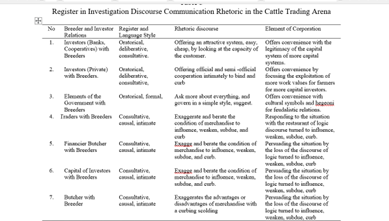Register role and function in the arena of sociocultural practice (critical study of sociocultural practice)
DOI:
https://doi.org/10.26555/bs.v43i1.342Keywords:
register, arena, socioculturalAbstract
This paper is entitled "The Role and Function of the Register in the Arena of Sociocultural Practices". This theme was raised because in the arena of sociocultural communication practices there is a hidden peculiarity in the form of deception, which is often inconsistent between linguistic aspects and sociocultural behavior. The use of the register as a style of communication rhetoric is built not without reason but contains the motives, intentions, achievements to be achieved. This paper aims to reveal: the form of the register, the role and function of the register, as well as the symbolic meaning of the register in the arena of sociocultural communication practices in the cattle trade. For this reason, a qualitative descriptive method is needed, which attempts to substantially describe aspects of the meaning of the data with in-depth analysis related to the subject matter. In order to arrive at an in-depth interpretation, the following theoretical knowledge is used: sociocultural, sociolinguistic, capitalism, hegemony, hegemonic, and hermeneutic as a strategic method for understanding texts whose meaning must be interpreted. The results of the study indicate: there are forms of oratorical, deliberative, consultative, casual, intimate registers. The function of the register is to act as an instrument of conative and emotive manipulation to influence, weaken, subdue, and restrain hegemonic control or domination. The register has a symbolic meaning of feudalism relations in the form of a phenomenon in the arena of sociocultural communication practices influenced by the discourse on capitalist cultural domination.
References
Alberico & Loisa. Retorika deliberatif selebgram dalam motivasi audiens melalui media sosial. Jurnal Koneksi, 3(1), 236-243. https://doi.org/10.24912/kn.v3i1.6215
Aminuddin. (1995). Pengantar apresiasi karya sastra. Sinar Baru Algensindo.
Badudu, Z. (1994). Kamus umum bahasa Indonesia. Pustaka Sinar Harapan.
Barker, C. (2011). Cultural studies, teori dan praktik. (Terjemahan: Nurhadi). Pus¬ta¬ka Pelajar.
Black, J. A., & Dean J. C. (1992). Metode dan masalah penelitian social (Terje¬mahan:¬ E. Koeswara, dkk). Remaja Rosdakarya.
Chaer, A. (2010). Kesantunan berbahasa. Rineka Cipta.
Chaer, A., & Agustina, L. (1995). Sosiolinguistik. Rineka Cipta.
Gayatri, M., & Rohaidah, K. (2018). Pemerolehan dan penguasaan leksikal bahasa Melayu kanak-kanak India di perse¬kolahan. Pertanika Journal Mawangsa, 5(1), 413-421. http://psasir.upm.edu.my/id/eprint/68406/
Hendrikus, W.D. (2017). Retorika terampil berpidato, berdiskusi, berargumen, berne¬go¬siasi. Kanisius.
Kandi, U. (2017). Teori kekuasaan Michel Foucault: Tantangan bagi sosiologi politik. Jurnal Al Khitabah, 3(1), 118.
Keraf, G. (1990). Diksi dan gaya bahasa. Gramedia.
Ratna, N. K. (2009). Paradigma sosiologi sastra. Pustaka Pelajar.
Krisdimanto, N. (2014). Pierre Bourdieu, sang juru damai. Kanal, 2(2), 203. https://doi.org/10.21070/kanal.v2i2.300
Suseno, F. M. (2001). Pemikiran karl marx. Gramedia.
Moleong, L. J. (1991). Metodologi penelitian kualitatif. Remaja Rosda Karya.
Nababan, P.W.J. (1993). Sosiolinguistik: Suatu pengantar. Gramedia Pustaka Utama.
Ningeh, M. I. (2010). Retorika dan penggunaannya dalam berbagai bidang. Jurnal Persisi, 6 (12), 61-71. https://doi.org/10.23887/prasi.v6i12.6828
Patria, N., & Arif, A. (2015). Antonio gramsci, negara dan hegemoni. Pustaka Pelajar.
Prayitno, H. J. (2015).Tindak kesantunan berbahasa dalam dialektika pembelajaran pragmatik: berdaya, berorientasi, dan berstrategi kesantunan positif. Proseding Seminar Nasional Prasasti II. https://jurnal.uns.ac.id/prosidingprasasti/article/view/64/48
Rahardi, R. K. (2017). Manifestasi fenomena ketidaksantunan prak¬matik berbahasa ber-asaskan budaya Indonesia. Journals Pertanika, Mahawangsa, 4(1),147-166. http://www.fbmk.upm.edu.my/
Rajiyem. (2005). Sejarah perkembangan retorika. Jurnal Humaniora, 17(2), 142-153. https://doi.org/10.22146/jh.839
Ritzer, G., & Goodman, D. J. (2009). Teori sosiologi dari sosiologi klasik sampai perkembangan mutakhir teori sosial postmodern (Terjemahan: Nurhadi). Pustaka Pelajar.
Skeggs, B. (2013). Perasaan kelas (sosial): Afeksasi dan budaya dalam penciptaan relasi kelas (sosial), dalam the wiley-blackwell companion to sosioligi (Terjemahan: Daryatno). Pustaka Pelajar.
Soekanto,S. (1990). Sosiologi suatu pengantar. Rajawali Pers.
Soeparno. (2018). Dasar-dasar linguistik umum. Tiara Wacana.
Sulistyarini, D., & Zainal, A. G. (2020). Buku ajar retorika. A.A.Rizky.
Sutopo, H.B. (2006). Metodologi penelitian kualitatif: Dasar-dasar teori dan terapannya dalam penelitian. Universitas Sebelas Maret.
Sutrisno, I., & Wiendijarti, I. (2014). Kajian retorika untuk pengembangan berpidato. Jurnal Komunikasi, 12(1), 70-84. https://doi.org/10.31315/jik.v12i1.359
Suwito. (1983). Pengantar awal sosiolinguistik, teori, dan problema. Henary Offset.
______. (1985). Sosiolinguistik pengantar awal. Universitas Sebelas Maret.

Additional Files
Published
Issue
Section
License
Copyright (c) 2023 Sujarwa Sujarwa, Andrik Purwasito, Sri Kusuma Habsari, Titis Srimuda Pitana

This work is licensed under a Creative Commons Attribution-ShareAlike 4.0 International License.

1.jpg)



